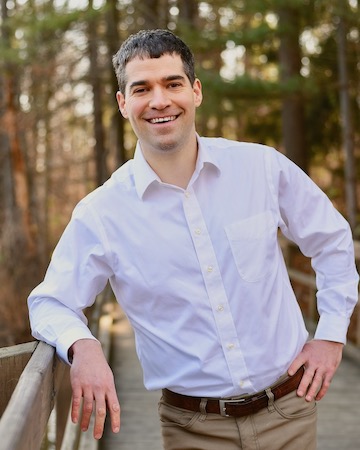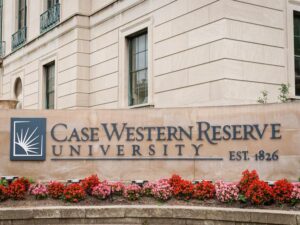
Dr. Nathan Lamkin
Clinical Psychologist
About Myself and the Therapeutic Process
I still vividly remember walking back to my dorm room from a college course in computer science at Miami University. I was only several weeks into college, and that course was supposed to be the heart of my upcoming career, however, I realize that I disliked the whole experience. I knew I could not stay in the field. It was the existential career decision that many people face at some point in their life, and in particular during their early 20s. During that depressive and anxiety filled walk back, a spontaneous thought came to me that I need to become a psychologist. The introspective and caring aspects of the field were such a natural fit. Over the years, my diverse and numerous experiences have only reinforced this decision.

Those experiences started during college where I majored in psychology and pre-med. I was fascinated with psychology from the start, leading me to take extra courses and graduating with almost a semester extra of credits. At the same time, I realized even then those academic experiences can only take you so far. Therefore, during my college years, I volunteered for several years at a suicide hotline and rape crisis center that would require me to spend some late nights to help people dealing with trauma, suicide, depressions, anxiety and acute psychological issues. During that time, I also wanted to gain experience in the scientific aspect of the field. I participated in research that examined how our perception of people's faces can be influenced by something as simple as knowing their name.

My clinical and academic experience during college reinforced my initial enthusiasm to become a psychologist. Thus, I decided to spend my college summers at an Americorp sponsored residential treatment program. There I lived with youth that had severe and chronic psychological issues. About half came from inner city Boston with the other half living from all around the country. The experiences of living with people dealing with severe psychological issues provided me with a deeper appreciation of how psychological turmoil deeply impacts a person’s life. Also, how the mind in its chaotic form can shift in extremes – going from intense hatred of a person to intense bonding towards that same person. It taught me the importance of being a consistent figure for a person whose mind felt so inconsistent. It taught me the value of the use of humor, firmness, acceptance, letting something go, pointing something out, and much more. That immersive experience was so fruitful that I ended up doing it for three summers. It culminated in leading a clinical staff and group of thirteen troubled teenage boys.

Before going to graduate school to become a psychologist, I wanted to augment psychological understanding by working within a research program. I was fortunate to get an opportunity to work with two different research teams at Case Western Reserve University for two years. One involved an in-depth look at bipolar disorder and its far-reaching implications. We did lengthy interviews and then quantified the responses to provide insights and increase understanding about direct and indirect impacts. I also help conduct research in adults with severe Bipolar and Major Depression Disorder who received Electroconvulsive Therapy (ECT) to help treat their issue. The other research team involved extensive cognitive testing of twins ages 9-15. It assessed the effects of genetics and environmental factors on cognitive functioning. This helped me to further appreciate how biological and environmental factors impact our mind. These research projects further reinforced the complex factors that influence cognition and emotions, and how they interrelate.
During that time, I began planning for graduate school with plans to earn a doctorate in clinical psychology. I knew I wanted to spend the next 5-6 years going in-depth in studying psychology and becoming a therapist. After interviewing at multiple programs, I decided on Indiana State University in Terre Haute, Indiana. While living in this small blue-collar town, I was able to significantly increase my clinical understanding of psychology. I was grateful for having such individual attention, as each graduating class had between 6-8 students. This helped me grow and refine my craft of therapy, psychological testing, and assessing various psychological issues. In addition, this was the beginning of tradition psychotherapy. I worked in multiple community mental health programs both within the city and more rural areas, as well as, at the college counseling center. These clinical experiences allowed me to treat a different demographic, dealing with a diverse range of issues (e.g., depression, anxiety, schizophrenia, drug abuse, PTSD, OCD, etc.).
For someone to complete their doctorate, it is necessary to complete a pre-doctoral internship. It is the next step in the long evolution of becoming a psychologist. I interviewed at several programs all over the country. It was an exciting time to branch out and further develop my skills. I ended up going to a psychiatric hospital in Pennsylvania. It was a wonderful experience. I was provided and took advantage of the diversity of clinical opportunities. This included one day a week doing outpatient therapy, and three days rotating with inpatient adults, inpatient adolescents, and an adult day hospital. This provided me with the experience of all levels of psychological care a client may have. It helped me understand and assess which level of care is best for each person. It also allowed me to work with intense and less intense psychological issues. Besides those experiences, I also was able to provide treatment to the Amish community, lead outreach groups for the Amish, conduct domestic violent offender groups, and lead a meditation group.

Right after my internship I had the opportunity to be a visiting professor at a well-respected liberal arts college, Franklin and Marshall College. Here I was able to grow and deepen my intellectual understanding of psychology. There is no better way to really understand something than teaching it to others. I taught courses on Foundations of Psychotherapy, Introduction of Psychology, and Psychology Methods. It was a very useful and fruitful experience to go from learning about it to teaching it to people that do not have much knowledge of the field. My love for clinical work remained, so I volunteered at the college counseling center where I was also able to have a small case load which provided therapy to students at the college.
While I thoroughly enjoyed my time at Franklin and Marshall College, I knew my true love was providing therapy to people dealing with psychological difficulties. This eventually led me back to Northeast Ohio, where I was born and raised. Like my experiences before coming back to Ohio, I strived to develop my clinical skills and interests by working in a variety of settings and populations. This included working at Western Reserve Psychological Associates, a respected group practice of psychologists that have been serving the area for over 40 years. I appreciated their integrity, nice setting, and good people. There I was known as a therapist who would see almost anyone from ages 14 to older adults. I had a case load where I had several long-term clients, but also clients that I would see on a shorter basis. I based this upon the needs of the client. I was also a part-time therapist and psychologist at John Carroll University and Kent State University. Those settings complimented the group practice experience and gave me the opportunity to treat people during a time of significant life transition. I have always enjoyed working with college students. Due to my love of meditation and spirituality I also started a meditation group at John Carroll.
After spending additional time in college settings, I wanted to expand and develop skills working with different populations including those where there are a lack of psychologists. This includes the elderly and military population. For the elderly population I became the sole therapist and psychologist for two 100 bed nursing homes. This has provided me with unique experiences in helping people cope with and accept their physical decline, isolation, lack of control over their environment, and upcoming death. I also joined the Ohio Army National Guard as a Behavioral Health Officer, where I assess and provide very brief treatment to soldiers. I have found that this has complemented my love for private practice.
Starting in January 2022, I left Western Reserve Psychological Associates to start my own practice. I wanted to create a space and practice that spoke to me and hopefully to the people I treat. I have been very thankful of all my past experiences, and hope and plan to effectively integrate these experiences to best treat the clients I serve.
While those external experiences play an essential role in treating my clients, it is also important to acknowledge the internal processes going on these years that contributed to my clinical treatment and understanding. This includes my unwavering desire for self-understanding. I cite several examples to help exemplify this. One includes leaving my position as a visiting professor and delaying other clinical jobs to spend a year at a Zen Buddhist Monastery. I had a natural desire to turn away from external forms and demands, and the rewards it can provide to refine and clarify internal understanding. This also occurred during graduate school at a Christian Monastery where I would also spend many evenings meditating. These experiences turning inward has undoubtedly deepened my appreciation of people and the array of experiences they have in their lives.
For a shorter professional bio, visit my Linkedin account:
